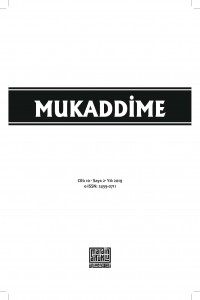Öz
German orientalism started out in the context of theological studies and
evolved into a philological discipline. Then, it experienced a process that
turned into cultural and social work. Martin Hartmann (1851-1918) played an
important role in the construction of this change, by challenging to the
tradition of classical philology in the late 19th century and made the living
Orient a part of German orientalism. Working on different subjects, from Berber
folk tales to Arabic press and Arabic studies, in the course of time, Hartmann
focused on political, cultural and literary studies related to the Islamic
world and the Ottoman Empire. In this context, the Young Turks became a
significant part of his writing. His close relationship with the Ottoman
intelligentsia and his own observations and impressions of Istanbul enabled
Hartmann to follow the Young Turks too nearly. This article firstly examines how Hartmann represents the Young Turk
thought in the context of the Ottoman modernisation from his early texts to his
later works and letters. Secondly it demonstrates the intellectual background
of the changes in his approach to the Young Turks.
Anahtar Kelimeler
Kaynakça
- From Hartmann to Johannes Heinrich Mordtmann, the letter of 13 December 1909, DMG Yi 116 I M (239) From Hartmann to Necip Asım, the letter of 2 July 1909, DMG Yi 116 I R (10,1) and R (10,2) From Hartmann to Fuat Raif Bey, the letter of 7 November 1909, DMG Yi 116 I N (11)
- From Hartmann to Karl Emil Schabinger von Schowingen, the letter of 4 December 1914, DMG Yi 116 I S (79, 1)
- The assessment report dated: 29 December 1913, PA AA Konstantinopel 417
- From Hartmann to German Foreign Office, the letter of 14 September 1917, PA AA Konstantinopel 402
- Fück, J. (1955). Die arabischen Studien in Europa bis in den Anfang des 20. Jahrhunderts. Leipzig: Otto Harrassowitz Verlag.
- Haarmann, U. (1974).“Die islamische Moderne bei den Deutschen Orientalisten” . (Ed.), F. Kochwasser, R. Roemer, Araber und Deutsche Begegnungen in einem Jahrtausend. Tübingen-Basel: Horst Erdmann Verlag: 56-91.
- Hanisch, L. (2000). Machen Sie doch unseren Islam nicht gar zu schlecht:Der Briefwechsel der Islamwissenschaftler Ignaz Goldziher und Martin Hartmann 1894-1914. Wiesbaden: Harrassowitz Verlag.
- ______________(1992). Islamkunde und Islamwissenschaft: Der Briefwechsel zwischen Carl Heinrich Becker und Martin Hartmann (1900-1918). Leiden: Dokumentatiebureau Islam-Christendom.
- Hartmann, M. (1875). Die Pluriliteralbildung in den semitischen Sprachen: mit besonderer Berücksichtigung des Hebräischen, Chaldäischen und Neusyrischen Bildung durch Wiederholung des letzten Radicales am Schluss und des Ersten nach dem Zweiten. Halle an der Saale: Buchdruck des Waisenhauses.
- __________________ (1909c).“Der Islam 1908”. Mitteilungen des Seminars für Orientalische Sprachen an der Königlichen Friedrich-Wilhelms-Universität zu Berlin, Jahrgang XII: 33-83.
- __________________ (1909b) Der Islam: Geschichte Glaube und Recht. Leipzig: Haupt Verlag.
- _________________(1909a) “Abdulhamid”. Das freie Wort:Frankfurter Halbmonatsschrift für Fortschritt auf allen Gebieten des Geistigen Lebens 9 Jahrgang: 138-148.__________________(1910b).“Deutschland und der Islam”. Der Islam Bd. I: 72-92.
- __________________ (1910a). Unpolitische Briefe aus der Türkei. Der islamische Orient: Berichte und Forschungen. Bd. III . Leipzig: Haupt Verlag.
- __________________(1911). “Wie sieht es in Arabien aus?”. Berliner Tageblatt und Handelszeitung Morgen Ausgabe, 40 Jahrgang Nr. 446: 1.
- __________________ (1912). Fünf Vorträge über den Islam. Leipzig: Verlag von Otto Wiegand.
- __________________(1913). Reisebriefe aus Syrien. Berlin: Dietrich Reimer Verlag.
- __________________(1914).“Islampolitik”. Koloniale Rundschau 5, 11/12: 580–603.
- __________________(1915).“Die weltwirtschaftliche Wirkungen des Heiligen Krieges”. Weltwirtschaft: Zeitschrift für Weltwirtschaft und Weltverkehr.Organ der Deutschen weltwirtschaftlichen Gesellschaft IV. Jahrgang Nr. 10/11: 255-257.
- __________________(1916b).“Türkisch”. Die Welt des Islams, Bd. IV Heft 1/2: 17-25.
- __________________.(1916c). “Das türkische Kunstempfinden und das Suchen nach einem Stil”. Die Welt des Islams Bd. IV Heft 1/2: 97-99.
- __________________(1916a).“Turanismus”. Das neue Deutschland 5. Jahrgang Heft 6: 149-153.
- __________________(1916d). “Der Aufbau Anatoliens”. Deutsche Levante-Zeitung: Monatsschrift für d. Handel u. Verkehr mit d. Mittelmeer- u. Levante-Ländern 6. Jahrgang Nr. 7: 255-256.
- __________________(1916e).“Ostwestliche Beziehungen”. Der neue Orient: Korrespondenzblatt der Nachrichtenstelle für den Orient III. Jahrgang: 139-142.
- __________________(1918a).“Die Probleme der Islamwelt (I)”. Die Islamische Welt:Illustrierte Monatsschrift für Politik Wirtschaft und Kultur Nr. 1: 5-8.
- __________________(1918c).“Die Probleme der Islamwelt (II)”. Die Islamische Welt Nr. 2/3: 75-78.
- __________________(1918b).“Die Probleme der Islamwelt (III)”. Die Islamische Welt:Illustrierte Monatsschrift für Politik, Wirtschaft und Kultur, Nr. 6/7:224-228.
- Heine, P. (2002). “Die Deutsche Gesellschaft für Islamkunde”. (Ed.), Rainer Brunner, Monika Gronke, Jens P. Laut, Ulrich Rebstock Islamstudien ohne Ende:Festschrift für Werner Ende zum 65. Geburtstag. Würzburg: Ergon Verlag:175-181.
- Kon, K. (2013). I. Dünya Savaşı’nda Almanya’nın İslam Stratejisi. İstanbul: Küre Yayınları.
- _________ (2012).“I. Dünya Savaşı’nda Yeni Bilgiler Işığında Mehmed Âkif’in Almanya Seyahati”. Toplumsal Tarih 217: 2-8.
- Kramer, M. (1989). “Arabistik and Arabism: The Passions of Martin Hartmann”. Middle Eastern Studies vol. 25 No. 3: 63-86.
- Mangold, S. (2004). Eine weltbürgerliche Wissenschaft: Die deutsche Orientalistik im 19. Jahrhundert. Stuttgart: Franz Steiner Verlag.
- Marchand, S. L. (2009). German Orientalism in the Age of Empire Religion, Race, and Scholarships. New York: Cambridge University Press.
- Mark, R. A. (2012). Im Schatten des Great Game: Deutsche Weltpolitik und russischer Imperialismus in Zentralasien 1871-1914. Paderborn-München-Wien-Zürich: Verlag Ferdinand Schöningh.
Ayrıntılar
| Birincil Dil | İngilizce |
|---|---|
| Bölüm | Makaleler |
| Yazarlar | |
| Yayımlanma Tarihi | 28 Kasım 2019 |
| Gönderilme Tarihi | 25 Ağustos 2019 |
| Yayımlandığı Sayı | Yıl 2019 Cilt: 10 Sayı: 2 |
e-ISSN: 2459-0711
Mukaddime is licensed under a Creative Commons Attribution-NonCommercial 4.0 International License (CC BY NC).

